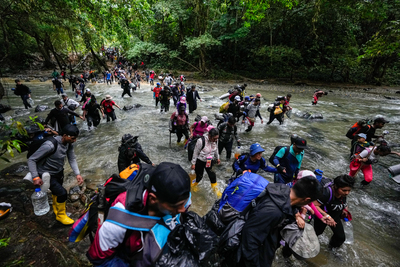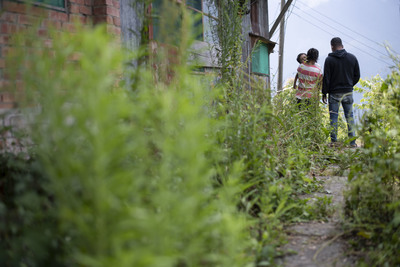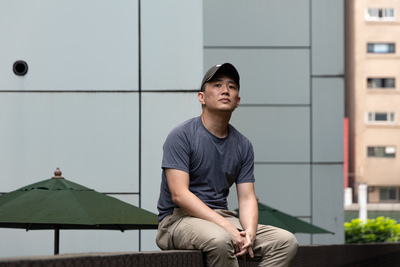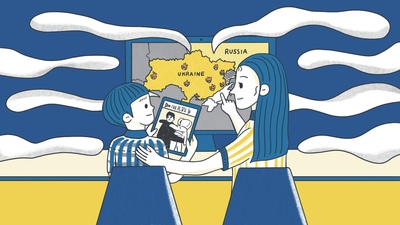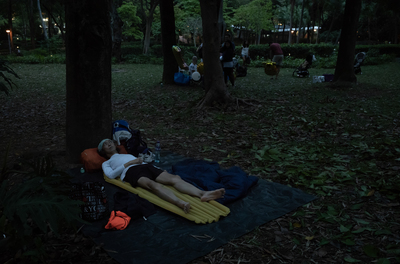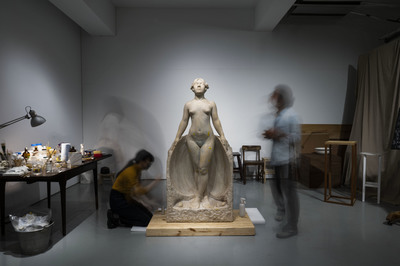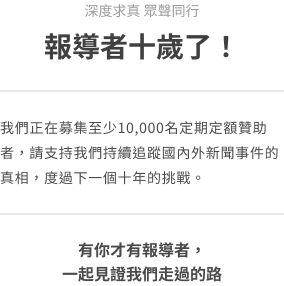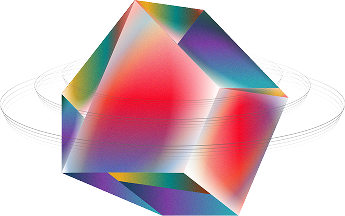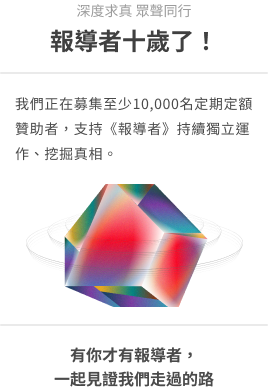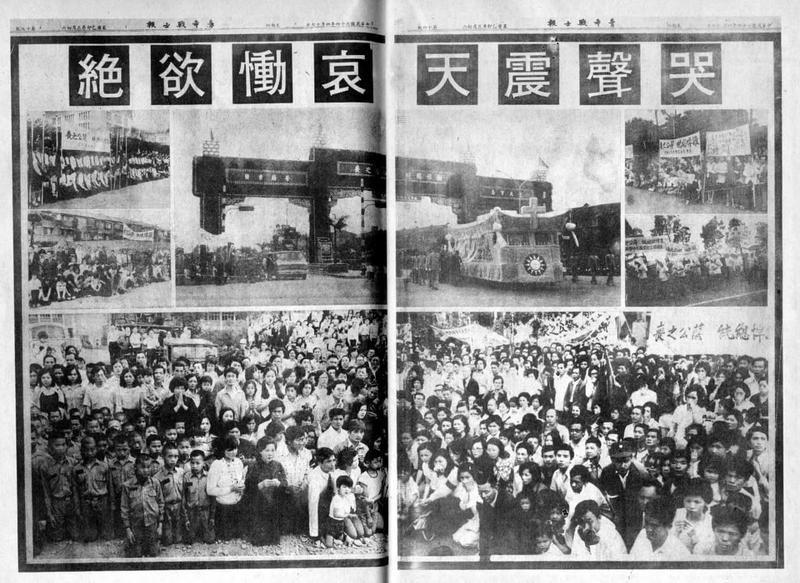
In the 1960s, Taiwan initiated an export substitution policy, and economic growth began to reach into the double digits. At the same time, martial law was firmly entrenched, and political indoctrination deeply penetrated society. I was born in 1961, just in time to grow up during this era.
The schools were like party-state values factories. Early in the morning, the loudspeakers would blare in song: "retake, retake, retake the mainland"(反攻、反攻、反攻大陸去) while our young bodies would march in military step towards the courtyard assembly. We arranged ourselves in rows, did calisthenic exercises, and listened to the military officer's directions.
Our assigned readings would repeatedly remind us of our leader's heavenly gifts: The Youth of President Chiang, The Industrious President Chiang, The Patriotic President Chiang and finally, The Great President Chiang. When we spoke the words"President Chiang", we were required to rest one breath, and when we heard others use those words, we were supposed to sit upright to show reverence.
Every year on October 31, the school would display an incense table in the auditorium along with a plaque reading :Congratulations to the President, Born X Decades and X Years Ago." Row after row of children would come forward and bow, after which, they were each given a pink and delicious "peach of longevity."
When I was in middle school, the god-like emperor suddenly died, and the outdoor fair the school planned that day was abruptly cancelled. For a period of time, all amusements were completely called off, and newspapers would only print in black and white. Every day, news anchors would report in heartbroken tones, saying words like "a great man has suddenly died, and now, heaven and earth grieve together."
Students wore black armbands, and had to sing the convoluted lyrics of Chin Hsiao-yi's (秦孝儀) Chiang Kai-Shek Memorial Song as well as recite the Will and Testament of Chiang Kai-shek. "I bind my hair and henceforth follow my Premier, Sun Yat-sen (孫逸仙), to the revolution!'
Before his remains were moved to a mausoleum in Daxi (大溪), Chiang was placed in Sun Yat-sen Memorial Hall so the public could pay their respects. As the hearse moved down the road towards the Hall, every group and school had to stand by passively. My school was on Jianguo South Road, and on that day, students and teachers from all over Taiwan were standing on the sidewalks of Ren'ai Road. We held our incense and waited, and when the hearse approached we knelt together and kowtowed to the departed spirit. It was a spectacular scene.
We were then mobilized to walk towards Sun Yat-sen Memorial Hall. From eight in the morning, we waited agonizingly in a line that snaked endlessly like a dragon, finally entering the exhibit hall in the evening. Lying in a coffin on a platform, President Chiang looked a little frightening, but in the hall many people kowtowed emotionally. Their cries undulated and my classmates put their faces into their hands and wept. This situation made me very anxious, and I couldn't help but blame myself: how could I not cry? How could I be so unpatriotic?
In the two days before high school entrance examinations, a Communist Chinese pilot defected to Taiwan in his MiG fighter and became a talking point for anti-Communist propaganda. The examination question was suddenly changed to "The Lesson of the MiG Defector," leaving many exam takers at a loss for what to write.
My three years of high school were a time of great political changes in Taiwan. In the first semester of my first year, the third supplementary elections for the Legislative Yuan took place. The tangwai candidates Stella Chen (陳婉真) and Chen Ku-ying (陳鼓應) set up a "democracy wall" outside of the gates of National Taiwan University, while the KMT set up a "patriotism wall" to counter it. After school I would always go over and join the crowd that encircled them, watching.
Then, our "loyal ally" the United States suddenly broke off diplomatic relations, an event that shook the nation. A friend of mine who studied at Taipei First Girls' High School (北一女高中) said that the day the news broke, the school's military instructor led them around the courtyard track, raising their fists and singing loudly over and over "I Love China" (我愛中華). At my school's morning assembly, the principal gave an impassioned speech, pulling off her wedding ring and announcing that she would donate it "as an offering to her country." The girls underneath the podium gasped in unison in undying admiration.
The China Youth Corps (中國青年反共救國), a KMT youth organization, printed stickers and sent them to every school. As I worried for my country and its people, I took a sticker which read "so long as I am here, China will surely be strong" and stuck it to my desk. Every day I quietly recited it, giving myself encouragement. Later I decided to apply to the political science department at National Taiwan University to dedicate myself to my country's service.
Without realizing, this intense patriotic education and leader worship turned me into a standard issue "party-state youth." The distance between my parents and I grew and our relationship became increasingly tense by the day. My father hated the patriotic propaganda that I admiringly espoused.
One time, while watching a nationalistic state-made variety show called The National Day Patriotic United Evening Show (國慶愛國同心晚會), I hummed along to a song called China Will Surely Be Strong (中國一定強). My father couldn't bear it anymore; he turned the TV off, and said harshly "you're singing the song of a fallen nation!" Without thinking, I accused him of being unpatriotic. Later I saw a similar scene in Wu Nien-jen's (吳念真) film A Borrowed Life (多桑) in which the children accused their father, who cheered for the Japanese national baseball team, of being a traitor. I only then realized my "unpatriotic" father wasn't a special case.
In my second year, the Formosa Incident exploded into view and the protesters were uniformly and repeatedly attacked by the press. I aired my opinions at dinnertime, and recited off lines with righteous indignation. "They were conspirators with ill motives trying to overthrow the government." My father saw that I was deeply poisoned, and shook his head saying, "it's over, it's over, my daughter is brain-damaged." He was so angry that he couldn't finish dinner. Mid-argument, my father said, "You don't understand anything! You don't know about 228…" As soon as those numbers left his mouth, my mother cut him off in Taiwanese Hokkien,"don't talk about that, the child will talk about it outside…."
My mother later forbade me from applying to the political science department, fearing that my hot-headedness would lead me to become a political criminal.
In the final semester of my final year, the evening before my graduation, the PA system called out ten students to report to the principal's office, and I was one of them.
He said "the bad people involved in the Formosa Incident were arrested because patriotic youth helped things along." He then took out an A4-sized paper bag, and firmly declared, "each one of you is also a patriotic youth. Go home and fill out this paperwork, and when you go to college, you can continue to serve your country." I naively raised my hand and asked, "but we haven't even taken our exams yet, how do we know which university we'll be attending?" The director solemnly replied, "There's no need to worry, when the time comes, someone will contact you!"
Wow! I couldn't believe it, being a part of this mysterious yet honourable "national service" society! I excitedly took my paper bag home and told my parents, "I'm going to be like Yangtze One (長江一號)!" — the codename for a war hero in the Second Sino-Japanese War. It never occurred to me that the party-state would go so far as to use the patriotic zeal of youth to monitor classroom discussions.
My parents whispered deep into the night with furrowed brows. The next morning, my father forbade me from turning in the forms. He said, "you aren't thinking clearly, a lot of people would be killed because of you!" That day, I was so sad that I cried all the way to school, and tactfully declined the director's opportunity to serve my country.
But in the same semester, the mother and daughters of Taiwan democracy activist Lin Yi-hsiung (林義雄) were stabbed to death in their own home. A chill ran down my spine when I read the report in the China Times (中國時報). The murders took place on February 28, a day fraught with meaning that even the dimmest individual could make a connection. I began to feel confusion and doubt.
Even the most seemingly omnipotent and carefully crafted party-state apparatus isn't without its flaws. Once you see the cracks, you start to examine them. Then the time comes for myths to collapse, and values to be rebuilt.
(To read the Chinese version of this article, please click: 【戒嚴生活記憶】陳翠蓮/一個黨國青年的成長過程 )
深度求真 眾聲同行
獨立的精神,是自由思想的條件。獨立的媒體,才能守護公共領域,讓自由的討論和真相浮現。
在艱困的媒體環境,《報導者》堅持以非營利組織的模式投入公共領域的調查與深度報導。我們透過讀者的贊助支持來營運,不仰賴商業廣告置入,在獨立自主的前提下,穿梭在各項重要公共議題中。
今年是《報導者》成立十週年,請支持我們持續追蹤國內外新聞事件的真相,度過下一個十年的挑戰。

